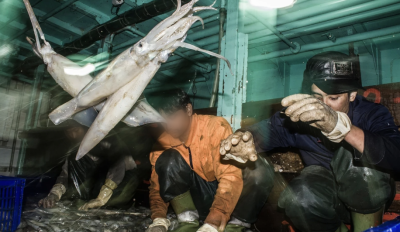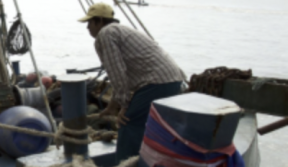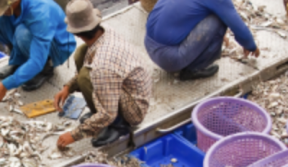
Publication Date:
Photo courtesy of Lu yu jui 盧昱瑞
This report contains the comments of the Seafood Working Group (SWG) concerning Taiwan’s ranking in the United States Department of State’s 2023 Trafficking in Persons (TIP) Report. The TIP Report is a requirement of the Trafficking Victims Protection Act (TVPA). In 2022, the U.S. Department of State maintained Taiwan at its Tier 1 ranking on the basis that “Taiwan authorities fully meet the minimum standards for the elimination of trafficking.”
In 2023, the SWG finds that Taiwan should be given a Tier 2 ranking on the basis that it does not fully meet the TVPA’s minimum standards but is “making significant efforts to bring themselves into compliance with those standards”. To maintain a Tier 1 ranking, governments need to demonstrate appreciable progress each year in combating trafficking. During the reporting period, the Taiwanese government made efforts to improve the working conditions in its distant water fishing industry; however, these have not been appreciable. The findings of this submission show that Taiwan has not demonstrated significant progress in 2022-2023 to maintain a Tier 1 ranking.
This submission analyzes the Taiwan government’s progress on the eight prioritized recommendations made by the U.S. Department of State to Taiwan in the 2022 TIP Report pertaining to the fishing sector. The SWG found that the Taiwan government made no progress related to four of the recommendations: (1) amending relevant policies and legislative loopholes to eliminate the imposition of all recruitment fees and facilitate direct hiring; (2) continue to strengthen efforts to screen for trafficking among vulnerable populations; (3) extend trafficking victim identification authority to key stakeholder agencies; and (4) increase efforts to prosecute and convict traffickers.
The SWG found that the government made limited progress in the other four areas: (1) increasing inspection in the distant water fleet; (2) expanding the mandate of foreign port-based Fisheries Agency personnel; (3) formally including civil society input into the labor broker evaluation process; and (4) increasing resources and implement anti-trafficking training for police, prosecutors, and judges.
Throughout 2022, the Taiwanese government made efforts to improve the working conditions in its distant water fishing industry. Despite this, significant barriers remain that are contributing to forced labor and severe forms of trafficking in Taiwan. While the Fisheries Agency raised the monthly salary for distant water fishers, the minimum wage for all other categories of workers in Taiwan, including coastal and offshore fishers, remains significantly higher, underscoring the discriminatory treatment of foreign migrant fishers in the distant water fleet. The Fisheries Agency’s National Action Plan on Fisheries and Human Rights (May 2022) established a 10-month maximum time at sea for distant water vessels, but this time period is still well beyond the 90-day maximum time at sea period recommended by international organizations.
Ongoing, widespread abuse of migrant fishers reported by local organizations continues due to structural features of Taiwan’s governance of labor conditions in the distant water fishing industry. The Taiwanese government has the power to address these issues, but it has not done so sufficiently during this reporting period. In particular, the “two-tiered employment system” has not been abolished; under this system, migrant workers in the distant water fishing industry work with fewer legal protections and labor rights compared with all other categories of workers in Taiwan.
Taiwan has not implemented effective policies and other enforcement actions to manage systemic recruitment practices that contribute to severe forms of trafficking and forced labor. To date, the Ministry of Labor and the Fisheries Agency have not taken any steps to eliminate the imposition of recruitment fees on migrant workers or to promote direct hiring.
It is critical to ensure freedom of association rights in order to prevent severe forms of trafficking into forced labor, yet migrant workers in Taiwan’s distant water fishing fleet continue to face significant barriers to exercising their rights to freedom of association due to a lack of Wi-Fi access on vessels. Even though Taiwanese law allows foreign migrant workers the right to form and lead unions, without access to Wi-Fi and the ability to contact their unions, migrant workers are not able to exercise their fundamental rights to freedom of association and collective bargaining.
Recommendations
The SWG supports the recommendations made by the U.S. State Department TIP Office to the Taiwanese government in 2022. In addition, we ask the TIP Office to support the following recommendations to the Taiwanese government in 2023:
- Abolish the overseas employment scheme for migrant fishers, apply the Labor Standards Act to all fishers, and ensure that all migrant fishers are governed by the Ministry of Labor and thus afforded the same rights and protections as Taiwanese fishers.
- Establish a clear timeline for swift and full domestication and implementation of the ILO Work in Fishing Convention, 2007 (No. 188).
- Increase inspections of Taiwanese-owned and -flagged as well as Taiwanese-owned, foreign-flagged vessels, and prosecute the owners and senior crew suspected of forced labor, especially among distant water fishing vessels.
- Deploy labor inspection personnel in foreign ports where Taiwan’s distant water fishing vessels are authorized to port, and train all maritime-related inspection authorities on victim identification and law enforcement.
- Increase transparency in the fishery sector by requiring disclosure of vessel position (i.e., publishing Vessel Monitoring System or Automatic Identification System, and punishing vessels for turning either off), 100% observer coverage (independent human or effective electronic catch monitoring, such as camera and remote sensor), and ensuring the safety of all observers on all fishing vessels.
- Ensure access to encrypted Wi-Fi for fishers on all distant water fishing vessels in Taiwan’s fleet.
- Ensure migrant workers’ internationally-recognized rights to freedom of association and collective bargaining in accordance with ILO Conventions 87 and 98, including protection against retaliation for organizing and union activity and ensuring non-interference with independent worker organizations by employers or the government.


